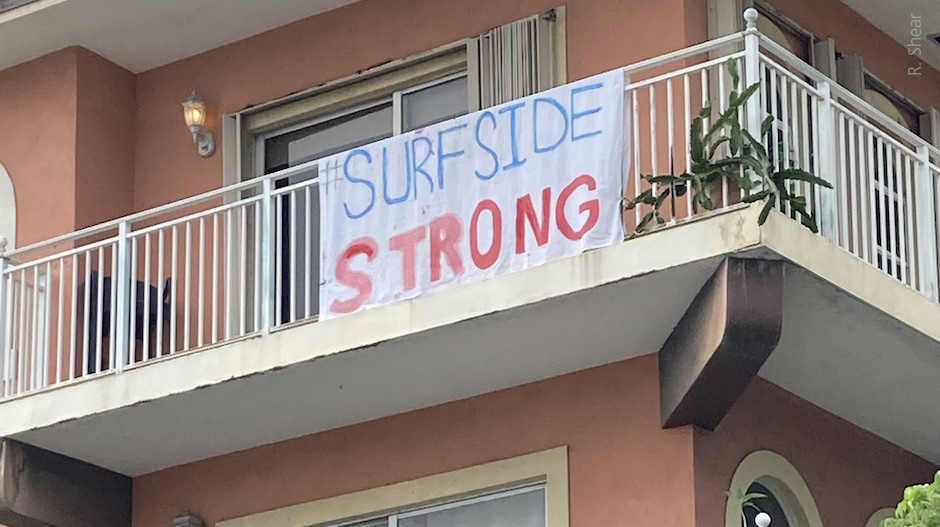The June 24 collapse of the 12-story Champlain Towers South in Surfside, Florida, left behind a pile of burning debris, a rising death toll, and a mountain of unscalable anguish for a close-knit community. In addition to search and rescue teams, emergency responders fast on the scene included crisis counselors, chaplains, even therapy dogs. But what about the long-term emotional toll?
Noting the significant human suffering caused by this extremely rare, unfortunate event, Dr. Arsham Alamian, SONHS associate dean for Health Studies and associate professor, says many people, particularly families of the several dozens who lost their lives, as well as the first responders, will face significant mental health challenges. “It is paramount that we provide mental health resources, such as one-on-one counseling, to these individuals so they can cope with the potential long-term psychological consequences of such an adverse event,” he says. Alamian, a fellow of the American College of Epidemiology, points out additional public health ramifications to be addressed. “Some of the families who lived in the part of the condo that did not collapse also face housing challenges; public health officials should assist these individuals with appropriate housing options and financial support until they can relocate to a new residence,” he says. “Lastly, while the causes of this tragedy are still under investigation, it is clear that they were structural in nature. As such, reviewing and improving building codes, as well as monitoring and identifying structural issues will likely become an even higher priority than ever before.”
Risk of PTSD
The sooner those in distress can get psychological help, the better, says Dr. Deborah Salani, associate professor of clinical and director of the Psychiatric Mental Health Nursing Post-Master’s Certificate Program at SONHS. “Family members and friends of the victims experienced a huge shock with this event. Because of the magnitude of this disaster, I think we are going to see a lot of post-traumatic stress disorder in this case, for rescuers, and for families and friends,” says Salani, a board-certified psychiatric mental health nurse practitioner. “Within the first 30 days, according to the Diagnostic and Statistical Manual of Mental Disorders (DSM-5, the bible of psychiatry), the impact is considered acute stress disorder. Over time, though, without effective care and treatment, acute stress disorder may transition to PTSD.”
Psychiatric nurse practitioners assess, diagnose, and treat patients with a focus on pharmacological interventions, but in a case like this Salani advises seeing a specially trained grief therapist. “During my years working in the pediatric ICU, I interacted with many parents who lost children, and I always recommended a grief counselor. Additionally, children who experience a major loss in their lives would also benefit from a pediatric grief therapist. It is important to process everything and try to move on,” she says. “Some people may not move on. They may become stuck in their grief or anger. The aftermath of losing someone doesn’t always hit you till months later, and then it can hit you hard.”
And that, says Salani, is just when those individuals may be feeling most alone. “There is a lot of support from family and friends immediately following a loss, when people are still in a state of shock, but it can be weeks and months down the line before some people really start grieving, and unfortunately by then most of the support may have dissipated.”
Tips for Self-Care
The psychological impact ripples out beyond those who knew someone in the condo tower or responded to the unprecedented disaster. “The tragedy in Surfside has received attention all over the world, particularly given the multicultural and international character of the residents, and especially in our local community, where so many people have some connection to the building or to someone who lived there,” says Dr. Victoria Behar-Zusman, SONHS associate dean for research and professor, and a licensed psychologist specializing in family therapy.
In addition to a shared sense of loss, the devastating event also bred widespread fear and anxiety during an already-stressful pandemic, especially for those living in high-rise buildings. “The condo collapse carries tremendous emotional weight, in part because it happened where people typically feel most safe — in their homes — and it happened in the middle of the night, when most people are ‘safely’ asleep in bed,” says Behar-Zusman. “This event doesn’t only cause general anxiety, but also can affect people’s ability to sleep with tranquility, which can have a tremendous impact on well-being, so it’s important to address this issue with a health provider and with some preventative strategies.”
Behar-Zusman offers these tips for managing our psychological response to the situation:
- Limit exposure to news about the event.
- Anxiety is contagious, so think about your own responses and how you’re expressing yourself (especially with children); on the same note, set boundaries with your own exposure to people who are constantly focused on the event.
- Be informed and proactive about the safety of your home/building.
- Also, remember that this was a very rare event, so our sense of vulnerability is likely greater than our actual risk.
- For children, try to increase their sense of security by setting the boundaries mentioned above, but also by trying to maintain bedtime routines while being comforting and reassuring.
# # #
For anyone in need of emotional support following the building collapse in Surfside, a free bilingual grief counseling hotline is at 833-848-1762. Additional resources can be found at https://namimiami.org/resources-during-covid19.

